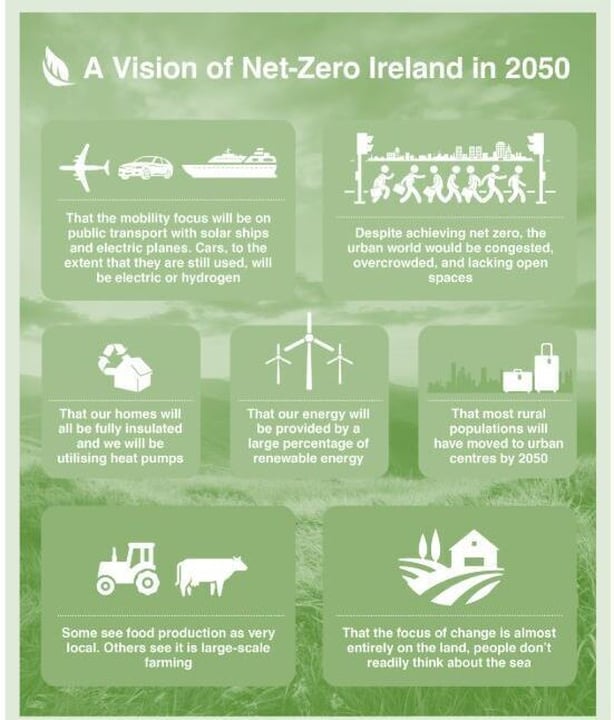Although awareness of climate change is high among the Irish public, a sense of urgency about the issue and understanding of individual impact remains a challenge, according to a new Government report.
The report highlights that a significant gap exists between climate intentions and climate actions among the public.
The report is the "Climate Conversation 2023" report which draws on input from 12,000 individuals as part of the National Dialogue on Climate Action.
It found that while awareness of climate change is high, a sense of urgency and understanding of individual impact remains a challenge.
It also identifies the importance of a just transition across all sectors to ensure Ireland's response to the climate challenge is equitable and inclusive.
The findings show most people intend to do more, such as switching to an electric car or investing in solar panels for example.
It says, however, that while the intentions indicate a readiness for larger climate actions, people are worried about the cost and range of electric cars, the payback on solar, and do not know where to start on their retrofitting journey.
Among the observations are that many people would be reluctant to live car-free and are sceptical about adopting heat pumps.
Many men in particular cannot see themselves eating a diet with less meat.

Across the generations, young people identify with the freedom to take flights and struggle with the idea of flying less.
Older people identify with traditional forms of heating and can struggle with the concept of warmer homes without an open fire, for example.
The report found behaviour change can be influenced by many factors including perceived benefits, financial incentives, cultural identity and generational attitudes.
However, it also highlights that people are not clear as to what actions have the biggest impacts.
It refers to its findings that Irish people, mistakenly, do not recognise that driving an electric vehicle is one of the best ways to reduce impact on the environment.
It also found climate action policy is viewed by some citizens as being middle-class, urban and Dublin-centric and this can alienate people in more regional and rural areas.
It found an underlying belief amongst citizens that climate policies are top-down initiatives that fail to understand the regional and rural populations that they are seeking to engage.
Older citizens see their identity being eroded through bans on turf whilst farmers see criticism and disregard for their livelihood.
The Department of Environment Climate and Communications said it hopes the insights from the report will help to unlock both individual and community-wide barriers to engaging on climate action.
Minister for the Environment Eamon Ryan welcomed the report and said: "This report highlights the crucial role people and communities are already playing in driving climate action.
"There are green shoots throughout the country. You only have to travel around the country to see the number of solar panels going up on roofs every week to see that people will enthusiastically adopt to new greener ways, particularly if they see the benefit for them and their community.
"It also gives us a clear insight into what we have to do to connect with people in a better way, to bring people with us as we make this transition to warmer homes, better communities, green jobs and agriculture.
"If there’s one really salient issue from this report it’s that every aspect of climate action must be viewed through a just transition lens.
"If we don’t have a fair transition, it won’t be fast, and if we don’t have a fast transition it won’t be fair for anyone."








